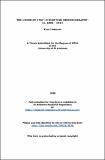The Union of 1707 in Scottish historiography, ca.1800 - 1914
Abstract
In the nineteenth century, Scottish patriotic aspirations, unlike other nationalist
movements in Europe, were not defined as a demand for the re-establishment of a
nation-state. Rather, Scots considered that the most effective way to protect their
nationhood was involvement in the Union and equal partnership with England, as
Scotland could play a significant role in the British Empire. In this sense, Scottish
patriotism had two objectives; while it encouraged further involvement in the Empire,
it equally denied a mere anglicisation. Scottish Nationalism was firmly connected to
British Unionism.
This dissertation examines the issue of how historical interpretations of the
Union were formed during the nineteenth century by analysing the correlation
between the interpretations and the contexts which gave rise to them. Until 1914,
Scottish historiography provided the concentric idea of national identity with
convincing evidence, at the centre of which was the Union of 1707. As he believed in
the principle of progress, Sir Walter Scott saw the Union as a separating point from
the feudal and savage past, though he attempted to reconcile the British present with
the Scottish past. Under Scott's influence on historical research - with its stress on
source-oriented historical narrative - historians, such as John Hill Burton, concluded
that the Union was a safety-valve to preserve the Scottish nation. On the other hand,
Burton and Patrick Tytler disregarded pre-Union Scottish history because of her
backwardness caused by feudal tyranny. Since Home Rulers aimed at the more fair
and effective representation of Scotland in Britain rather than separation, they
promoted the Union's significance in a national history. Indeed, the bicentenary of the
Union was considered as a good opportunity to remind both Scots and English of the
original spirit of equality and mutual sacrifice of the Treaty. The positive interpretation
of the Union was further consolidated by professional and academic historians like
James Mackinnon and Peter Hume Brown. In retrospect, these academic historians
completed the process of creating a national history of Scotland within the British
Empire, with, at its centre, there was a positive account of the Union.
Type
Thesis, MPhil Master of Philosophy
Collections
Items in the St Andrews Research Repository are protected by copyright, with all rights reserved, unless otherwise indicated.

